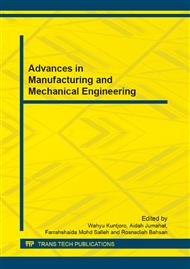p.481
p.487
p.493
p.499
p.505
p.510
p.516
p.525
p.532
Hydro-Petrol Engine: Study on Fuel Consumption and Effect on Environment
Abstract:
Over the years, global energy demand has been enormously increased as a result of industrial development and population growth. Supply of energy is far less than the actual demand which contributes to unstable worlds oil price. Furthermore, it is proven that fossil fuel is the major contributor for harmful aspects of human activity and biophysical environment issues. This paper attempts to investigate performance of hydro-petrol engine system as an alternative to reduce dependencies to fossil fuel; emitting less harmful gaseous to the environment. For this system, Oxy-hydrogen (HHO) or also known as brown gas was produced through electrolysis method before channeled into air intake manifold of a typical 4 strokes petrol engine. The research measured petrol consumption as well as the by product gaseous. It was found that the fuel consumption reduced to 22% while the CO2 and HC gases reduced to 15% and 20% respectively when compared to unmodified engine system. Feasibility of the concluded research data will become a pathway for more comprehensive and in depth study on Hydro-petrol engine to prove its capability to reduce dependencies on fossil fuel and provide alternatives for a more environmental friendly energy approach.
Info:
Periodical:
Pages:
505-509
DOI:
Citation:
Online since:
September 2013
Keywords:
Price:
Сopyright:
© 2013 Trans Tech Publications Ltd. All Rights Reserved
Share:
Citation:


